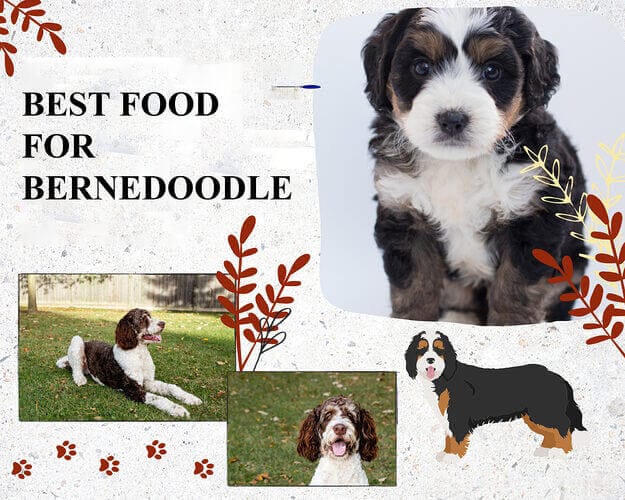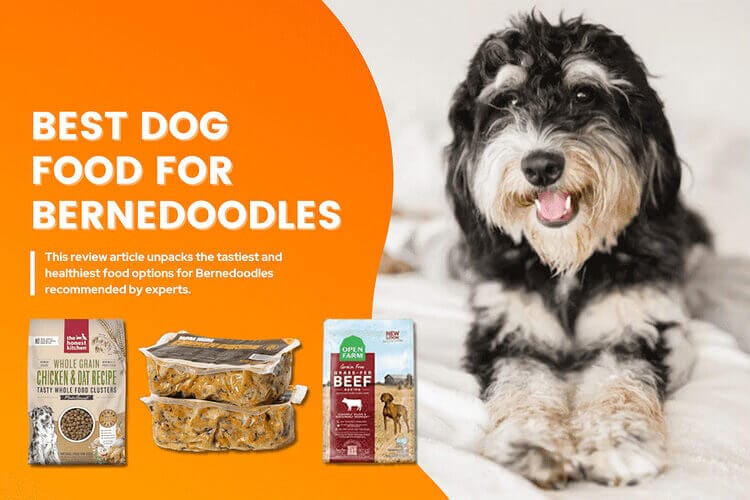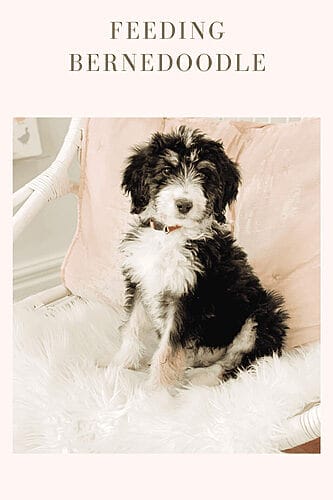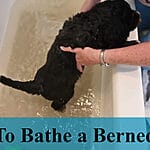Unleash Health & Happiness: The Ultimate Bernedoodle Food Guide

Let’s face it, Bernedoodles are captivating canines. With their playful personalities, adorable teddy bear looks, and undeniable loyalty, they’ve quickly stolen the hearts of dog lovers everywhere. But beyond the fluff and fun lies a responsibility to ensure their well-being. The best food for Bernedoodles plays a crucial role in their health and happiness, impacting everything from their energy levels and shiny coat to their overall development and potential for allergies.
This comprehensive guide delves into the world of Bernedoodle nutrition, equipping you with the knowledge to make informed decisions about your furry friend’s diet. We’ll explore their essential dietary needs, delve into the pros and cons of popular best food for bernedoodle options, and answer some burning questions Bernedoodle owners often have.

Looking for the best grain-free food for Bernedoodles or wondering how much food to feed a Bernedoodle? Don’t worry, we’ve got you covered! This guide will equip you with the knowledge to navigate these decisions with confidence.
Understanding Bernedoodle Nutrition
Just like humans, Bernedoodles require a balanced diet to thrive. Their specific needs vary depending on age (puppy, adult, senior) and activity level. However, some core nutrients remain constant:

- Protein: The building block for muscles, organs, and a healthy coat. Look for dog food with real meat sources listed as the first ingredient. Dog nutrition experts recommend a protein content of 22-32% for puppies and 18-25% for adults.
- Fats: Essential for providing energy, maintaining healthy skin and fur, and aiding in nutrient absorption. Look for best food for bernedoodle containing healthy fats like omega-3 and omega-6 fatty acids.
- Carbohydrates: Provide readily available energy for your Bernedoodle’s active lifestyle. Choose complex carbohydrates from whole grains like brown rice or oatmeal over simple carbohydrates like sugar.
- Vitamins and Minerals: Play a vital role in various bodily functions. A high-quality dog food should include all essential vitamins and minerals.
- Fiber: Aids in digestion and gut health.
Bernedoodle diet considerations go beyond these basic building blocks. Let’s explore some additional factors to keep in mind:
- Age: Puppies require a higher protein and calorie content for growth and development. Senior Bernedoodles might benefit from a diet formulated for joint health or easier digestion.
- Activity Level: Highly active Bernedoodles will need more calories than their couch potato counterparts. Adjust portion sizes accordingly.
- Allergies: Some Bernedoodles may have food allergies or sensitivities. In such cases, a best food for Bernedoodles with allergies might be a limited ingredient diet or a novel protein source like lamb or fish.
Choosing the Best Food For Bernedoodle
Now that you understand the fundamentals of Bernedoodle nutrition, it’s time to explore your food options:

- Commercial best food for bernedoodle: The most convenient and readily available option. Look for high-quality dog food formulated specifically for large breeds or active dogs. AAFCO (Association of American Feed Control Officials) certification ensures the food meets minimum nutritional requirements. Here are some popular brands in the US known for quality dog food:
- Purina Pro Plan: https://www.purina.com/pro-plan/dogs
- Hill’s Science Diet: https://www.hillspet.com/
- Royal Canin: https://www.royalcanin.com/us/dogs/products
- Blue Buffalo: https://bluebuffalo.com/product-finder/dog/wilderness/
- Iams: https://www.iams.com/dog/dog-food
- Raw Food Diet: This option provides a diet closer to what a dog’s ancestors might have eaten. It typically includes raw meat, bones, organs, vegetables, and fruits. While potentially beneficial in terms of increased energy and improved digestion, a raw food diet requires careful planning, preparation, and consultation with a veterinarian to ensure it meets all your Bernedoodle’s nutritional needs.
Additional Points:
- Regardless of best food for bernedoodle you choose, consult your veterinarian for personalized dietary recommendations based on your Bernedoodle’s individual needs and health conditions.
- Regularly monitor your Bernedoodle’s weight to prevent obesity, a risk factor for various health problems.
- Avoid table scraps and processed human food, which can be unhealthy for dogs.
Feeding Your Bernedoodle
Here’s a general feeding guide to get you started:

- Puppies: Typically fed three to four times a day until they reach adulthood (around 12-18 months).
- Adults: Usually fed twice a day
- Always refer to the specific feeding recommendations on your chosen dog food packaging. These will take into account your Bernedoodle’s age, weight, and activity level.
- Provide fresh, clean water at all times. Water is essential for overall health and digestion.
Additional Tips for a Healthy Bernedoodle
- Schedule regular veterinary checkups. Your veterinarian can assess your Bernedoodle’s overall health and provide personalized dietary advice based on their individual needs.
- Maintain a healthy weight. Obesity can put strain on your Bernedoodle’s joints and lead to other health problems.
- Ditch the table scraps and processed human food. These can be unhealthy for dogs and can disrupt their balanced diet.
FAQs
FAQ 1: How often should I feed my Bernedoodle?
The frequency of feeding depends on your Bernedoodle’s age. Puppies typically need to be fed three to four times a day to support their growth and development. Adult Bernedoodles usually do well on two meals a day. However, it’s always best to refer to the specific feeding recommendations on your chosen best food for bernedoodle packaging.
FAQ 2: What are signs my Bernedoodle has food allergies?
Common signs of food allergies in Bernedoodles include itchy skin, excessive scratching, recurrent ear infections, vomiting, and diarrhea. If you suspect your Bernedoodle has food allergies, consult your veterinarian for proper diagnosis and dietary recommendations.
FAQ 3: Can I switch my Bernedoodle’s food suddenly?
It’s best to gradually transition your Bernedoodle to a new food over a period of 7-10 days. Start by mixing a small amount of the new food with their current food, gradually increasing the new food and decreasing the old food each day until they’re completely transitioned. This helps their digestive system adjust to the new food and minimizes the risk of stomach upset.
FAQ 4: Is homemade food a good option for Bernedoodles?
Homemade food can be a healthy option for Bernedoodles, but it’s crucial to ensure it meets all their nutritional needs. Consult with a veterinarian or a qualified animal nutritionist to create a balanced homemade diet for your Bernedoodle. They can guide you on the appropriate ingredients, portion sizes, and any necessary supplements to ensure your furry friend gets all the essential nutrients they need to thrive.
FAQ 5: What are some good treats for Bernedoodles?
Look for healthy treats formulated for dogs. Dog nutrition experts recommend treats that are low in calories and fat and high in protein. Here are some good options:
- Freeze-dried meat treats
- Fresh or frozen vegetables like carrots or green beans (cut into bite-sized pieces)
- Small pieces of cooked, lean meat (chicken, turkey)
- Fruits like apples or blueberries (in moderation)
Remember, consult your veterinarian before introducing any new treats to your Bernedoodle’s diet, especially if they have any health conditions.
Conclusion
Providing your Bernedoodle with the best food for Bernedoodles is an investment in their health and happiness. By understanding their nutritional needs, choosing a high-quality diet, and following proper feeding practices, you can help your furry friend live a long, healthy, and active life.
As the renowned veterinarian Pauline Armstrong once said, “The food you feed your dog is the single most important factor influencing their health and longevity.” With the knowledge gained from this guide, you can make informed decisions about your Bernedoodle’s diet and ensure they remain a healthy and playful companion for years to come.
Petscaretip – How To Care Your Pets
Address: 809 Dallas St, Houston, TX 77002, USA, Houston, TX, United States, Texas
Email: [email protected]






